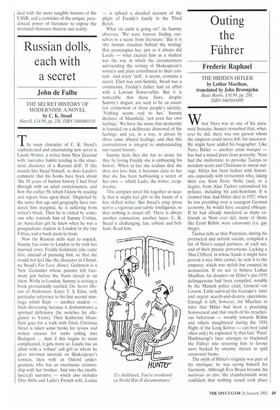Russian dolls, each with a secret
John de Falbe
THE SECRET HISTORY OF MODERNISM: A NOVEL by C. K. Stead Harvill, £14.99, pp. 230. ISBN 1860469310 The main character of C. K. Stead's sophisticated and entertaining new novel is Laszlo Winter, a writer from New Zealand with 'narrative habits tending to the structural character of a Russian doll'. If this sounds like Stead himself, so does Laszlo's comment that his books have been about 'the 50 years of human history I had lived through with an adult consciousness, and how the earlier 50, which I knew by reading and report, bore upon them'. Dispirited by the sense that age and geography have rendered him marginal, he is suffering from writer's block. Then he is visited by someone who reminds him of Sammy Conlan. an Australian girl he knew when he was a postgraduate student in London in the late Fifties, and a book starts to form.
Now the Russian dolls start to unpack. Sammy has come to London to be with her married lover, Freddy Goldstein (she came first, instead of pursuing him, so that she would not feel like the character in Christina Stead's For Love Alone). Goldstein is a New Zealander whose parents left Germany just before the Nazis closed in on them. While in London, Sammy is writing a book provisionally entitled The Secret Histo, of Modernism. Enter T. S. Eliot, with particular reference to his late second marriage which Rajiv — another student — finds distressing because it demonstrates a spiritual deficiency (he switches his allegiance to Yeats). Then Katherine Mansfield goes for a walk with Eliot; Christina Stead is taken some books for review and makes excuses for tanks rolling into Budapest ... And if this begins to seem complicated, it gets more so. Laszlo has an affair with a 'robust' call girl to whom he gives informal tutorials on Shakespeare's sonnets, then with an Oxford undergraduate who has an incestuous relationship with her brother. And into the (multi. layered)narrative — which also includes Otto Stiltz and Lazlo's French wife, Louise
— is spliced a detailed account of the plight of Freddy's family in the Third Reich.
What on earth is going on? As Sammy observes, We were forever finding ourselves in a scene from literature.' But it is 'the human situation behind the writing' that preoccupies her, just as it always did Laszlo — what excited him as a student was the way in which the circumstances surrounding the writing of Shakespeare's sonnets and plays contributed to their content. And every 'doll', it seems, contains a secret. Eliot was anti-Semitic, Stead was a communist, Freddy's father had an affair with a Latvian flower-seller. But it is noticeable that these flaws, despite Sammy's disgust, are seen to be an essential component of these people's identity. 'Nothing seems real to her,' Sammy declares of Mansfield, 'not even her own feelings.' We have the sense that modernity is founded on a deliberate disavowal of the feelings, and yet, in a way, is driven by those same abused feelings; and that this contradiction is integral to understanding our recent history.
Sammy feels that she has to atone for this: by loving Freddy she is embracing his history. When at last she realises that she does not love him, it becomes clear to her that she has been harbouring a secret of her own — which Lazio, the writer, reciprocates.
This complex novel fits together so neatly that it might feel glib in the hands of a less skilled writer. But Stead's crisp prose serves a vigorous and subtle intelligence, so that nothing is closed off. There is always another connection, another layer. C. K. Stead is challenging, fun, urbane and brilliant. Read him.


















































































 Previous page
Previous page